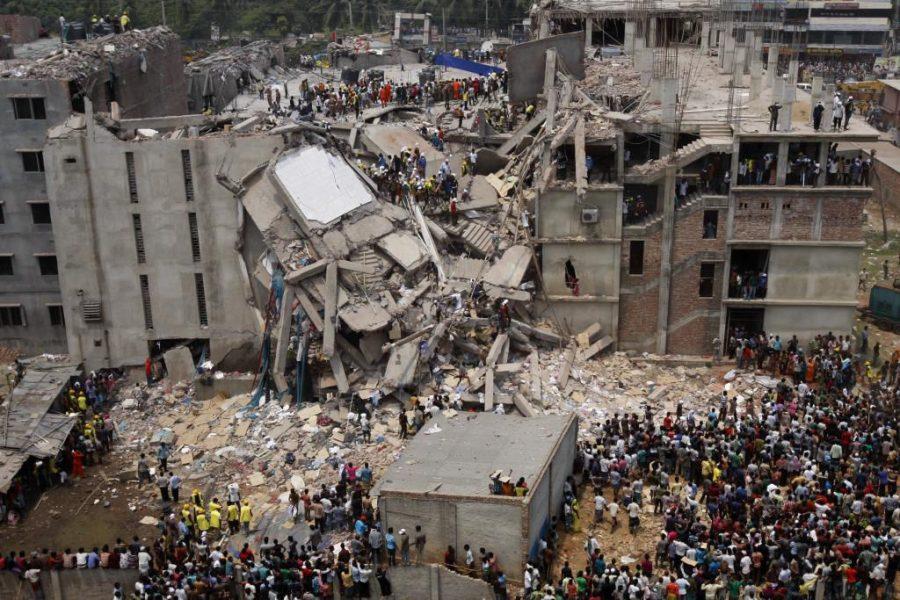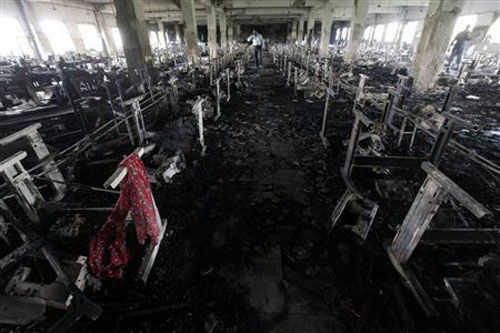Bangladesh, a small yet populous nation bordering India and the Bay of Bengal, has become a major producer of garments for well-known Western transnational corporations such as Wal-Mart and Gap. In light of the infamous Rana Plaza collapse in 2013 (which killed 1,134 workers), the Tazreen Fashions factory fire in 2012 (which killed 112 and injured around 200 workers), and at least five similar major incidents since 2010, pertinent questions have been raised regarding gender, labor, and worker’s rights in the country.
Nafisa Tanjeem, PhD Candidate in the Department of Women’s and Gender Studies at Rutgers, addressed these issues during an Oct. 3 guest lecture at the University of Massachusetts Boston titled “Can Workers of the World Unite? Disjuncture in Transnational Labor Organizing and Possibilities of Radical Coalition Practices”.
Ms. Tanjeem spent two years conducting fieldwork in Bangladesh and the USA, focusing on post-Rana Plaza developments and the nature of empowerment. Years after the Rana Plaza collapse, Ms. Tanjeem’s photos show human bones and burned debris still littering the rubble. They also show a still-under-construction facility in which people nonetheless work with heavy machinery as subcontractors.
Juxtaposed with this are the “Golden Girls” of Bangladesh, the female workers who are supposed to represent the modernity of the country. In Bangladesh, four million people are employed in the garment industry, which produces 75 percent of the country’s foreign exports. As 90 percent of garment workers are women, is employment thus a part of empowerment? Or are these women and their image being used incorrectly, especially in light of their scant rights and the dearth of safety standards?
“We, the consumers in the United States, are not disconnected from people who produce our clothes,” states Ms. Tanjeem. “We do have an ethical responsibility to question whether corporations that offer us cheap products are treating workers well and respecting their rights. We need to be vigilant about how workers are organizing around the world and whether we could meaningfully collaborate with them.”
Her field work examined local and international groups coming forward in the wake of Rana Plaza to address the rights of garment workers and establish a model for “fixing” the garment industry. The presentation explored the two initiatives deeemed to be the most important: Accord and Alliance, which lack accountability, apply arbitrary safety standards that are out-of-touch with the local landscape, and do not address the issue of female garment workers versus transnational corporations.
Alliance is a corporate code of conduct with no worker, union, or government involvement and no governing body. Alliance does not address unionization, and individual workers must negotiate one-
on-one for rights with the transnational corporation. Only 685 factories fall under the agreement of more than 5,000 country-wide. The agreement claims it would ban subcontracting although a majority of garment factories in Bangladesh are subcontractors, and corporations could leave Alliance at any time by paying a small fee.
Accord, legally binding and “like a private governance structure” or “external private governance body” according to Ms. Tanjeem, has the power to close factories for non-compliance, resulting in job-loss. The initiative covers 1,646 first- and second-tier factories (read: not subcontractors), yet more than 300 of these Accord-covered factories also fall under Alliance, making compliance with either or both agreements confusing and difficult. Accord mandates suppliers from whom to procure equipment, most of which are Western companies.
These agreements raise more doubts than answers. “We need to question income inequality in the United States – which is partly responsible for increasing demand for cheap products and encouraging corporations to search for non-unionized and cheap labor,” says Ms. Tanjeem. She also suggests a “universal standard of social protection coverage for all countries, global taxation, and local and global redistributive approaches that could go a long way to bring structural reforms and ensure workers’ rights.”
Though the Western world hears little of these problems or the proposed solutions, Ms. Tanjeem cautions that Western aid efforts “should not just mean taking simplistic efforts such as boycotting exploitative corporations or raising funds to ‘help’ garment workers – since researches have showed that these initiatives do not create long term meaningful impacts.” In the same vein, Accord and Alliance present their own troubles. We must educate ourselves before approaching the problems.
As a final message to UMass Boston students, Ms. Tanjeem urges them “to be informed. Take classes that will offer you critiques of corporate capitalism and neoliberal political economy. Get involved with on-campus social justice student organizations.” In this way we may be able to “learn to think critically, ask tough questions, challenge savior complexes, and recognize importance of grass root struggles and organizing.”
Two documentaries to watch for information on these issues are the Al-Jazeera piece “Fault Lines – Made in Bangladesh” (https://www.youtube.com/watch?v=4dQGl_lswYY) and the Fifth Estate documentary “Made in Bangladesh” (https://www.youtube.com/watch?v=onD5UOP5z_c).
The Tazreen Fashions Factory Fire in Bangladesh killed 112 and injured 200 people


